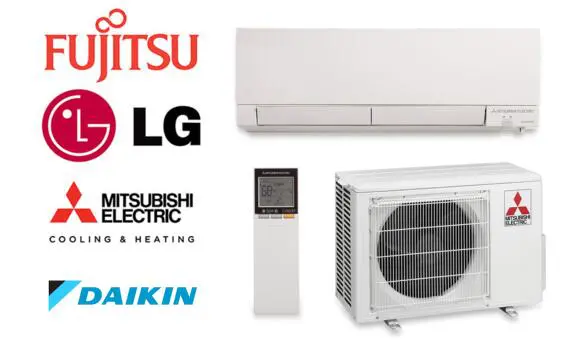
It’s no secret that summer temperatures are on the rise in BC. After experiencing the forest fires and heat waves over the past couple of years, you might be preparing for another scorching summer by installing an air conditioner. Before you do – have you considered cooling your home with a heat pump?
A heat pump is a versatile and energy efficient solution that functions to cool your home in the summer and heat it in the winter, keeping you comfortable all year round. Read on to find out exactly how a heat pump air conditioner works, and find the one that’s right for you!
Heating and Cooling with a Heat Pump
Not only is a heat pump a safe and effective way to heat your home in the winter, but it’s also fully equipped with a reverse valve that allows you to make a seasonal switch – turning it into a valuable cooling system for the summer months.
In places with a moderate winter climate, like Vancouver, a heat pump is a perfect energy-efficient solution to keep you warm in the winter. Acting as a heat transporter, it uses electricity to extract warm air from outside, move it through a cycle of compression and expansion, and pump the heated air into your home.
When switched into cooling mode, the heat pump removes warm air from inside, releases heat to the outside and circulates the remaining cool air throughout your home. Essentially, it becomes an air conditioner.
How are Heat Pumps and Air Conditioners Similar?
If your goal is to stay comfortable inside your home this summer, either a heat pump or air conditioner will do the job. Both systems function by moving heat from inside and transferring it outside. Air conditioners and heat pumps both use compressed refrigerant to collect excess heat from the indoor environment and pump it away to a location outside your home.
Heat Pumps vs Air Conditioners – Which is the Right Choice for you?
A heat pump is a system for all seasons. You can stay cool in the summer and warm in the winter without having to install, operate, or incur the expenses of two separate systems. An air conditioner is typically paired with a furnace to provide heat during the cold winter months.
If you’re not sure if a furnace or heat pump is the right choice for heating your home, have a look at our Heat Pump or Furnace blog to find out.
The Benefits of Using a Heat Pump to Cool your Home
On top of the simplicity and savings you’ll experience by having an all-in-one system, here are some other key benefits of using a heat pump air conditioner:
- Heat pumps are powered by electricity, so you can save substantially on fuel consumption and reduce your operating costs.
- They’re eco-friendly. Not only do heat pumps offer a clean and renewable alternative to a furnace that runs on fuel, but they also produce 97% less greenhouse gas emissions than a high-efficiency natural gas furnace
- Improved indoor air quality. Heat pumps provide air flow and filter dust, pollens, and other allergens out of the air in your home.
- You can save with rebates. BC Hydro, Clean BC, and the federal government all offer rebates for switching from a fossil-fuel heating system to electric.
What are your Heat Pump Options?
With heat pump popularity on the rise, there are more suppliers and more choices available. In BC, rebates are offered for air source heat pumps, and these are the best option. There are three types of air source heat pumps:
- Mini-split heat pump (also known as ductless heat pumps): This style of heat pump doesn’t require ducting. They have one or more heads installed outside to offer multi zone heating or cooling. Although easy to install, they can become less efficient with each head that you add.
- Central heat pump: A central heat pump has an outdoor unit connected to an indoor unit and uses ducts to move warm or cool air throughout your home.
- Ducted mini-split heat pump: Ducted mini-split heat pumps work in the same way as mini-splits, except that they also feature a hidden head with ducting running to vents in two or more rooms.
Every home is different, and the right choice for you depends on your unique needs and the framework of your home. Still not sure? Call the experts at Ashton for a customized assessment and recommendation.

